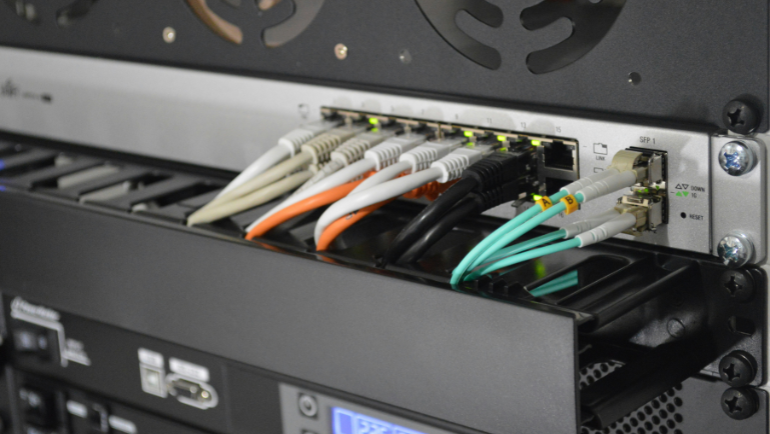
Ever feel like your Wi-Fi signal suddenly disconnects in certain corners of your workplace? Traditional routers often struggle to cover large spaces, resulting in dead zones. In comparison, Mesh Wi-Fi systems combine one or more mesh satellites to expand the coverage area of a single Wi-Fi network. In a Mesh Wi-Fi system, all connected devices seamlessly switch to the strongest internet signal. Since we’re interested in expanding Wi-Fi coverage, let’s delve deeper into mesh routers explained!
What is a Mesh Router?
A mesh router means a system of routers and extenders that eliminates dead Wi-Fi zones. Most businesses and workplaces encounter network dead zones due to obstacles like walls and glass doors, resulting in weak or no signal between multiple departments. Mesh Wi-Fi routers eliminate the issue of network disconnectivity each time the device switches between Wi-Fi network ranges. It is a worthy option for large businesses to experience seamless connectivity throughout the workplace.
Mesh Router Working
Wi-Fi Mesh Wi-Fi routers consist of one main router connected to multiple routers known as satellites or nodes. These nodes are connected to create an extensive network throughout the workplace. The router communicates with other nodes to discover the fastest band for your device and diverts the user’s traffic to the fastest band. Data passing between nodes is smooth for a regular mesh network device. That’s why users enjoy the same experience as connected to a single super-powerful wireless router with a strong, dependable Wi-Fi signal in every office area.
Pros and Cons of Mesh Wi-Fi Router
Mesh Wi-Fi routers have many pros and cons. Let’s explore their benefits and drawbacks.
Pros of Mesh Router
The following are the pros of getting a Mesh Wi-Fi router:
Easy Network Management:
The main advantage of mesh networks is easy network access, unlike other wireless products. Most mesh Wi-Fi router network systems can be configured with a mobile application, allowing easier network management than configuring with a computer. Mesh Wireless router management apps also allow users to check their Wi-Fi speed and control the network’s coverage to a particular area.
Stable Connections:
A Mesh Wi-Fi Router works on a single network rather than using different networks with different SSIDs. Nodes broadcast the same signal rather than routing requests through multiple networks. With mesh Wi-Fi routers, users don’t have to worry about lags and frequent network switching.
Top-Notch Security:
Most Mesh Wi-Fi routers provide better safety with frequent and timely firmware updates. However, many high-end Wi-Fi mesh routers automatically search and update firmware without user intervention to secure the network.
Cons of Mesh Router
Below are the cons of getting a Mesh Wi-Fi router:
Higher Cost:
A decent Wi-Fi mesh router costs more than a traditional router. Businesses can buy networking devices like standard Wi-Fi mesh system routers, which range from $150 to $1750. The price can vary from model to model, and variants.
Wasted Resources:
Buying a Wireless mesh router in small establishments and offices is not a better option as there are few dead zones. A mesh Wi-Fi network works optimally with a coverage area of more than 3000 to 5000 feet and multiple stories. SMEs (Small and Medium Enterprises) opt for extenders, repeaters or traditional routers for smaller coverage areas instead of the entire router mesh network.
Slight Delay in Latency:
Wi-Fi devices may incur unnoticeable delay increases when data is transported between satellite nodes. This is because data transits through more nodes before reaching the Internet, and each node introduces a slight delay while reading and retransmitting the data.
Mesh Network: Features
Mesh Network provides several features that will benefit your company. Here are some of the features that you can get.
One Network for Entire Workplace
A Mesh Wi-Fi network system is an intelligent technology that keeps you online. Even if one node fails, it will automatically connect to another node.
Stable Long-Range Connectivity
A mesh router provides a robust and steady connection regardless of where you are in your office. Each mesh node relies on the signal of the other nodes to strengthen Wi-Fi signals irrespective of your floor.
How Mesh Wi-Fi is Different from Other Wireless Devices.

A Mesh Wi-Fi network works the same way as a Wi-Fi extender or traditional router for sale, but some factors make Mesh Wi-Fi a better choice. Let’s see how it compares to similar network devices.
Mesh Wi-Fi Router VS Wi-Fi Extenders
Mesh Wi-Fi routers are factory-configured, and once you have configured the main hub, you can easily connect as many satellites as you want. On the other hand, mesh networks offer a powerful backhaul, unlike Wi-Fi extenders, which provide better signal strength and less interference and lag. Furthermore, Unlike Wi-Fi extenders, the Wi-Fi mesh network has a single SSID (service set identifier), eliminating the need to connect to multiple Wi-Fi’s on a single network.
Mesh Wi-Fi Router VS Traditional Router
Traditional routers are best at transmitting signals but have weak signal strength and small area coverage. Mesh Wi-Fi, on the other hand, provides internet access in a large area, making it a better choice for businesses with large offices and workplaces.
How To Set Up Mesh Wi-Fi?

Setting up a Wi-Fi mesh network is a simple, one-time process. Here are the steps to follow to set up your Mesh Wi-Fi network.
Setting up a New Wi-Fi Network
- Connect your Wi-Fi Mesh Router to the Modem and place the satellite at your desired locations.
- Keep the wireless mesh router in the middle of the office and place the satellites around the edges of the property.
- Configure the router using a web browser and check which node provides the best internet connectivity in each room.
Adding an Existing Router to a Mesh Network System
- Verify bridge mode and compatibility with connecting the existing router, as most mesh networks are built to work in a single unit.
- Connect your router with the main node of the mesh Wi-Fi Network using the ethernet cable.
- Now, configure the router into bridge mode. This will enable the Wi-Fi access point and disable the other functionalities.
- Configure the open Wi-Fi mesh router network using the mobile app or web interface.
Which Mesh System Type Should You Get: Wi-Fi 6e vs. Wi-Fi 7?
Mesh Wi-Fi systems offer 2.4GHz, 5GHz, and dual bands, where you can utilize the benefits of both bands. Most Enterprises prioritize dual-band mesh systems for better performance and to entertain more devices. However, Mesh Network has two Wi-Fi configurations, Wi-Fi 6e and Wi-Fi 7.
- Wi-Fi 6E is an extension to Wi-Fi 6 and the latest mainstream technology recommended for most businesses.
- Wi-Fi 7 is a future technology in the development and testing phases. However, it is not recommended for most businesses as most devices don’t support it at the user end.
Best Mesh Wi-Fi Router For Businesses
Wi-Fi Mesh router solutions have various beneficial features and functionalities. Multiple manufacturers provide Wi-Fi mesh solutions for enterprises and businesses. Computing Worlds has a variety of mesh routers that you can buy.
You can also request a bulk quote online for the required mesh wifi routers.
Frequently Asked Questions:
Do I Need a Mesh Router?
If your workspace has dead internet zones, opting for a mesh router system is the best option.
Does a Wi-Fi Mesh System Replace a Router?
Your mesh router system does not replace the traditional wireless router, although the mesh network system includes multiple routers.
Is Mesh Wi-Fi a Router?
No, mesh router systems are an entire solution based on multiple routers and extenders that create a system of seamless internet connectivity throughout the place.
That was a detailed overview of the Mesh Wi-Fi system and its advantages over other wireless devices. Mesh Routers have revolutionized enterprises and businesses by providing seamless internet access whenever business meetings or client calls are needed. Choose Wi-Fi 7, Wi-Fi 6 or 6E based on your specific needs and get your company’s best mesh router systems. Stay connected with the Computing Worlds blog to get updates about the networking world.






